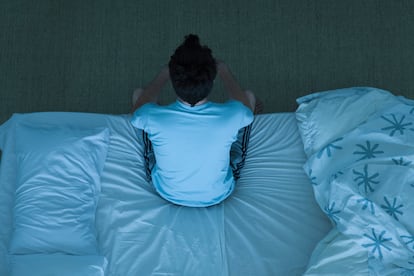Five more minutes! Is it a good idea to hit the snooze button?
Although sleep medicine experts have traditionally advocated limiting its use, a recent study contradicts this idea

In a dark room on the top floor of a building in Madrid, Spain, the shrill sound of an alarm clock breaks the silence of dawn. The time is 6:45 a.m. Carmen Montes fumbles with her digital clock and presses the snooze button to extend her sleep just a little longer. Five minutes later the alarm will sound again. Many days, the alarm will go off four or five times before she finally gets out of bed, between 7:05 and 7:15 a.m. “I consciously set my alarm before my waking time, probably because I’m tired and have a hard time waking up, and this way I have some time to procrastinate in bed. It’s the way I’ve found to sleep a little more with the peace of mind of knowing that the alarm will end up driving me crazy and I’m going to get up at the right time. I know it’s a bit contradictory because I don’t take advantage of that pleasant sleep time, but for me it serves as a starting gun shot,” explains Carmen.
The snooze button that many alarm clocks include is as common as it is controversial. Although there is no solid scientific evidence in this regard, sleep medicine experts have traditionally advocated limiting its use. Based on existing knowledge about the biological rhythms of sleep, this measure, in addition to abruptly interrupting sleep several times during the last part of the night — with the negative effects associated with sleep fragmentation — was believed to increase the sleep inertia, a temporary state in which cognitive and emotional abilities are altered just after waking up.
Now, a recent study published in the Journal of Sleep Research disagrees with this widespread idea. According to the research results, delaying the alarm up to three times in 30 minutes (with the alarm ringing for the first time at 7:30 a.m. and the sleeper extending it until 8:00 a.m. with the alarm beeping every ten minutes, for example) not only would have almost no effect on total sleep time (6 minutes less with the alarms, the researchers calculated), but it would also diminish the effects of sleep inertia, as the participants who used the snooze function showed better performance in several cognitive functions, such as arithmetic speed or episodic memory, right after waking up.
“When we started this project there were no other studies on this matter, so we wanted to provide a scientific basis for the claims that researchers and doctors have been making about this behavior, which have usually been based on what we know about sleep in general, but not about delaying the alarm, specifically,” Tina Sudenlin, lead author of the study, explains to EL PAÍS. According to this researcher from the Department of Psychology at Stockholm University, the study shows that extending sleep by half an hour with alarms has no negative effects on nighttime sleep or sleep inertia. “If anything, we saw some positive results, such as a lower likelihood of waking up from deep sleep or the fact that the participants who were allowed to extend their sleep also showed a slightly faster thinking speed when they woke up,” she says.
For María Ángeles Bonmatí, PhD in physiology from the University of Murcia and a researcher in chronobiology, the study has a series of limitations. On one hand, only people who regularly used this function in their daily lives participated, “which could mean that they were going to show good results doing what they usually do.” On the other hand, according to the expert, the fact that the first alarm was programmed half an hour before the waking up time prevents knowing the effects on sleep when one starts using the snooze function at a later time, or for periods longer or shorter than 30 minutes. In addition, according to the author of Que nada te quite el sueño (Let nothing keep you awake), the fact that the regular users of the snooze button were night owls is relevant, as it would show that the evening chronotypes are forcing their body to wake up at a time when it is difficult for them. “Most users of the snooze function were very sleepy in the morning, which may be linked to their chronotype and the need to get up early. On the other hand, the reason why most said they used this function was that they were too tired or unable to get up, which is related to significant sleep inertia.”
Sleep inertia, explains Manuel de Entrambasaguas, a neurophysiologist expert in sleep medicine at the Valencia Clinical Hospital in Spain, occurs mainly when we go from deep stages of sleep (particularly N3) to wakefulness. “This is what we experience when we take a bad nap and the brain enters this N3 phase of sleep when it shouldn’t. Then we wake up groggy, in a bad mood and with a bad body,” he says, before pointing out that the N3 stage usually occurs during the first half of the night and, therefore, should not be present in a relevant way in the second – that is, at the time of waking up.
Natural awakening, the healthiest option
According to Elena Urrestarazu, specialist in neurology and neurophysiology at the University of Navarra Clinic and vice president of the Spanish Sleep Society (SES), the healthiest thing is clearly natural awakening. No alarms. “When we have proper sleep hygiene with regular schedules, it is relatively common for us to wake up spontaneously shortly before the alarm goes off,” she points out.
Bonmatí agrees in this regard. Still, she is aware that the habits and obligations of the real world often force us to use the alarm, and that the fact that we isolate ourselves from the dawn with blinds and opaque curtains does not help, as it makes it harder for our body to prepare to wake up and, when the time comes, it happens abruptly and unphysiologically, with the shrill sound of the alarm clock.
Sign up for our weekly newsletter to get more English-language news coverage from EL PAÍS USA Edition
Tu suscripción se está usando en otro dispositivo
¿Quieres añadir otro usuario a tu suscripción?
Si continúas leyendo en este dispositivo, no se podrá leer en el otro.
FlechaTu suscripción se está usando en otro dispositivo y solo puedes acceder a EL PAÍS desde un dispositivo a la vez.
Si quieres compartir tu cuenta, cambia tu suscripción a la modalidad Premium, así podrás añadir otro usuario. Cada uno accederá con su propia cuenta de email, lo que os permitirá personalizar vuestra experiencia en EL PAÍS.
¿Tienes una suscripción de empresa? Accede aquí para contratar más cuentas.
En el caso de no saber quién está usando tu cuenta, te recomendamos cambiar tu contraseña aquí.
Si decides continuar compartiendo tu cuenta, este mensaje se mostrará en tu dispositivo y en el de la otra persona que está usando tu cuenta de forma indefinida, afectando a tu experiencia de lectura. Puedes consultar aquí los términos y condiciones de la suscripción digital.









































